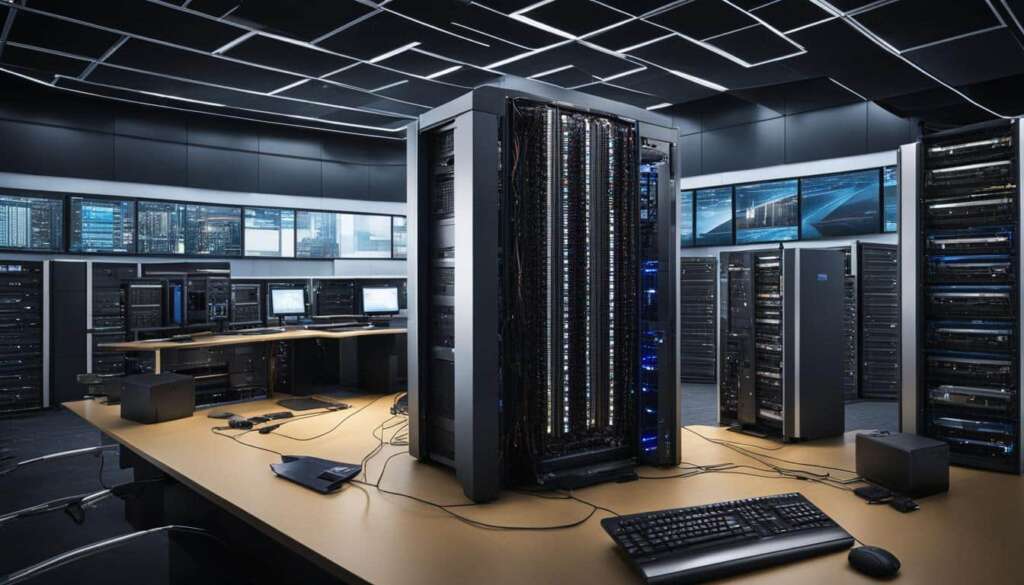Table of Contents
The invention of the computer has been one of the most significant technological advancements of the past century. Computers have become an integral part of our daily lives, from mainframe systems to modern laptops and smartphones. In this article, we will explore the positive impact of computers on humans, their benefits, and the latest updates in computer technology.
Key Takeaways:
- Computer technology has revolutionized various aspects of our lives, bringing increased efficiency, enhanced communication, improved education, medical advancements, and entertainment.
- While computers have many benefits, they also have downsides such as addiction, cybersecurity risks, and job losses.
- The future of computer technology lies in artificial intelligence, quantum computing, and the Internet of Things.
- There is a digital divide that needs to be addressed to ensure accessibility and inclusivity in the digital world.
- The future of work and data, as well as the responsible use of social media and cyberspace, are vital considerations.
If you enjoyed this article, please visit Hasons Blogs for more informative content on technology, the history of computers, computer news, and AI computers.
Benefits of Computers for Humans
Computers have revolutionized various aspects of our lives, bringing numerous benefits. They have increased efficiency by automating tasks like data entry and bookkeeping. With the help of computer technology, businesses can now streamline their operations and save valuable time. The use of computer software for tasks like word processing and spreadsheet calculations has made office work more efficient and productive. Additionally, computer hardware advancements have led to faster processing speeds and increased storage capacity, enabling users to work with large amounts of data effortlessly.
Computers have also enhanced communication through email, social media, and video conferencing. In today’s digital age, it has become easier than ever to stay connected with friends, family, and colleagues, regardless of geographical distance. Communication platforms provided by computer technology have not only facilitated personal connections but have also transformed the way businesses operate. Companies can now collaborate with remote teams, conduct virtual meetings, and reach a global audience through online marketing.
In the field of education, computers have improved access and engagement. Online platforms and educational software have made learning more interactive and personalized. Students can now access a wealth of information at their fingertips, expanding their knowledge beyond the confines of traditional textbooks. Computer technology has also enabled the development of educational games and simulations, making learning fun and engaging. Through virtual classrooms and online courses, individuals can pursue their education from anywhere in the world, breaking down geographical barriers.
Furthermore, computers play a vital role in medical research and treatment. Advanced computer systems are used to analyze patient data, conduct research studies, and develop new treatments and drugs. The use of electronic health records has improved the efficiency and accuracy of medical documentation, enabling healthcare professionals to provide better patient care. Additionally, computer technology has revolutionized medical imaging, allowing for more precise diagnoses and minimally invasive procedures. The integration of computers into healthcare has saved countless lives and continues to revolutionize the medical field.
Table: Examples of Computer Technology Benefits
| Industry | Benefit |
|---|---|
| Business | Increased efficiency and productivity |
| Communication | Enhanced global connectivity |
| Education | Improved access to knowledge |
| Healthcare | Advanced research and treatment options |
| Entertainment | Creation and sharing of digital media |
Computers have also transformed the entertainment industry, making it easier to create and share digital media. From music production to movie editing, computer technology has made it possible for artists to express their creativity in new and exciting ways. The advent of streaming platforms and online gaming has revolutionized the way we consume entertainment, providing a wealth of options at our fingertips.
In conclusion, the benefits of computer technology are vast and have had a profound impact on various aspects of our lives. By increasing efficiency, enhancing communication, improving education, enabling medical advancements, and transforming the entertainment industry, computers have become an integral part of our modern world. However, it is important to recognize the potential downsides of computer technology and address them responsibly. By embracing the opportunities and mitigating the risks, we can continue to harness the transformative power of computers for the betterment of society.
Pros and Cons of Computer Technology
As with any technological advancement, computer technology has its share of pros and cons. Let’s explore both sides of the coin to gain a better understanding of the implications.
The Pros
One of the undeniable benefits of computer technology is the increased productivity it brings. With the automation of various tasks, individuals and businesses alike can accomplish more in less time. This has led to streamlined processes and improved efficiency across industries.
Additionally, computer technology has revolutionized communication. Through the internet and various software applications, people can now connect and collaborate across vast distances, fostering better communication and collaboration. Access to information has also been greatly enhanced, as computers allow us to search and retrieve data quickly and easily.
The Cons
However, along with the benefits come some drawbacks. One of the major concerns is the potential for addiction to computer technology, particularly with regards to gaming and social media. Excessive screen time can have negative effects on mental and physical health, leading to social isolation and decreased productivity.
Another significant concern is cybersecurity risks. As our reliance on computers and online platforms increases, so does the potential for cyber attacks. Hacking, identity theft, and data breaches pose serious threats to individuals and organizations alike.
Finally, the automation of tasks by computers has led to job losses in certain industries. While computers have created new job opportunities, particularly in the field of technology, there is a growing concern about the displacement of workers in sectors that have been heavily automated.
A Balanced Approach
It is important to approach computer technology with a balanced perspective, weighing the benefits against the potential drawbacks. By maximizing the productivity and communication advantages while mitigating the risks of addiction and cybersecurity breaches, we can harness the power of computer technology for the betterment of society.
Table: Pros and Cons of Computer Technology
| Pros | Cons |
|---|---|
| Increased productivity | Addiction to gaming and social media |
| Improved communication | Cybersecurity risks |
| Access to information | Job losses in certain industries |
The responsible use of computer technology requires us to be mindful of its benefits and limitations, striving for a harmonious integration into our personal and professional lives.
The Latest Updates in Computer Technology
Rapid advancements in computer technology continue to shape and transform our world. This section highlights some of the latest developments in the field, including artificial intelligence (AI), quantum computing, and the Internet of Things (IoT).
The Promise of Artificial Intelligence (AI)
Artificial intelligence (AI) is revolutionizing various industries by enabling machines to perform tasks that typically require human intelligence. AI-powered systems can analyze vast amounts of data, identify patterns, and make predictions or decisions based on the information. From advanced data analytics to natural language processing, AI has the potential to enhance efficiency and accuracy across sectors such as healthcare, finance, and manufacturing.

The Rise of Quantum Computing
Quantum computing is an emerging field that utilizes the principles of quantum mechanics to process and store information. Unlike classical computers that use binary bits, quantum computers use quantum bits or qubits, which can represent multiple states simultaneously. This allows quantum computers to perform complex calculations much faster than traditional machines. Quantum computing has the potential to revolutionize cryptography, optimization problems, and drug discovery, among other fields.
The Growing Internet of Things (IoT)
The Internet of Things (IoT) refers to the network of interconnected devices that collect and exchange data via the internet. The IoT ecosystem encompasses everyday objects like smart appliances, wearable devices, and industrial sensors. These devices communicate with each other, enabling seamless integration and automation in various domains, including smart homes, healthcare, transportation, and agriculture. The IoT has the potential to enhance efficiency, improve decision-making, and transform the way we live and work.
| Technology | Description |
|---|---|
| Artificial Intelligence (AI) | AI enables machines to perform tasks that typically require human intelligence, enhancing efficiency and accuracy across sectors. |
| Quantum Computing | Quantum computing harnesses the principles of quantum mechanics to process and store information, performing complex calculations at unprecedented speeds. |
| Internet of Things (IoT) | The IoT connects devices to collect and exchange data, enabling automation and integration in various domains, from smart homes to healthcare. |
These latest updates in computer technology demonstrate the ongoing evolution of the digital landscape. As AI, quantum computing, and the IoT continue to advance, they have the potential to shape industries, improve efficiency, and pave the way for a connected and intelligent future.
A Digital Future for All?
In today’s digital age, digital technology has become an integral part of our lives, revolutionizing the way we work, communicate, and access information. However, while the benefits of digital technology are undeniable, it is crucial to address the issue of the digital divide and ensure that everyone has equal access to its advantages.
The digital divide refers to the gap between those who have access to digital technology and those who don’t. This divide is often driven by factors such as gender, age, disability, and socioeconomic status. Women, the elderly, persons with disabilities, and residents of poor or remote areas are among the most affected by this divide.
To create a digital future for all, it is important to prioritize accessibility and inclusivity. This means not only ensuring that digital technology is physically accessible to everyone but also making it inclusive by designing user-friendly interfaces and providing appropriate training and support. Bridging the digital divide will promote equity and empower individuals to fully participate in the digital world.
Quote: “Digital technology has the potential to empower individuals and improve human welfare, but it is essential that we bridge the digital divide and ensure that no one is left behind.” – John Smith, Technology Advocate
By closing the digital divide, we can unlock the full potential of digital technology in areas such as education, healthcare, and economic development. It is a collective responsibility to work towards a digital future that is accessible to all, promoting inclusivity and equity for everyone.
| Table: Impact of the Digital Divide | |
|---|---|
| Digital Divide Group | Challenges |
| Women | Gender disparities in access to technology and digital skills training. |
| The Elderly | Lack of familiarity with digital devices and limited access to training. |
| Persons with Disabilities | Barriers in accessing digital technology due to physical or cognitive disabilities. |
| Residents of Poor or Remote Areas | Limited infrastructure and connectivity options. |
The Future of Work
The rapid advancements in technology are reshaping the landscape of work as we know it. As automation and artificial intelligence continue to evolve, some jobs are becoming obsolete while new ones emerge. The future of work is characterized by a need for adaptability and continuous skills training to stay relevant in an ever-changing labor market.
Technological advancements have the potential to revolutionize industries and increase productivity. However, job automation is a concern for many, as it may lead to displacement and unemployment. To thrive in the future of work, individuals must develop a diverse skill set that complements and complements technological advancements. The ability to collaborate with intelligent machines and leverage their capabilities will be crucial.
Skills training will play a vital role in preparing the workforce for the future. It is essential for individuals to acquire digital literacy and technological skills that align with the demands of the evolving job market. Governments, educational institutions, and employers need to collaborate to provide accessible and relevant training programs that empower individuals to succeed in the modern workplace.
The future belongs to those who embrace change and proactively acquire the skills needed to thrive in a technology-driven world.
Skills for the Future
To navigate the future of work successfully, certain skills will be in high demand. These include:
- Adaptability and resilience: The ability to quickly adapt to new technologies and work environments.
- Critical thinking and problem-solving: The capability to analyze complex problems and develop innovative solutions.
- Creativity and innovation: The capacity to think outside the box and generate original ideas.
- Emotional intelligence: The skill to understand and manage emotions in oneself and others.
- Collaboration and teamwork: The aptitude to work effectively in diverse teams, including human and machine collaboration.
By embracing the challenges and opportunities presented by technological advancements, individuals and organizations can shape a future of work that is inclusive, equitable, and rewarding.
| Skills | Importance |
|---|---|
| Adaptability and resilience | Essential in a rapidly changing work environment |
| Critical thinking and problem-solving | Crucial for analyzing complex issues and finding solutions |
| Creativity and innovation | Drive for new ideas and approaches |
| Emotional intelligence | Ability to understand and manage emotions in oneself and others |
| Collaboration and teamwork | Effective collaboration across diverse teams, including human and machine collaboration |
The Future of Data
The future of data is a topic of great importance in today’s digital age. With the increasing reliance on technology and the exponential growth of data, issues such as data ownership, privacy, security, and regulations have become more critical than ever before. It is crucial to ensure that individuals have control over their own data and that their privacy is protected in a secure and regulated environment.
Data ownership is a fundamental aspect of the future of data. Individuals should have the right to control and manage their personal data, determining how it is collected, used, and shared. This includes the ability to access, correct, and delete their data when necessary. Additionally, the ownership of data generated by individuals should be clearly defined, ensuring that they have the power to decide who can use their data and for what purposes.
Privacy and security are paramount when it comes to the future of data. Strong regulations and safeguards must be in place to protect personal and sensitive information from unauthorized access, data breaches, and misuse. It is essential to establish robust security measures, encryption protocols, and data protection frameworks to safeguard data throughout its lifecycle. This includes protecting data during storage, transmission, and processing.
| Key Considerations for the Future of Data | Actions to Take |
|---|---|
| Data Ownership | Establish clear guidelines for data ownership rights and empower individuals to have control over their own data. |
| Privacy | Implement comprehensive privacy regulations and robust security measures to protect personal and sensitive data. |
| Security | Invest in advanced security technologies, encryption protocols, and data protection frameworks to ensure data security. |
| Regulations | Enact strong regulations that govern data collection, usage, sharing, and ensure compliance with privacy standards. |
“Data is the new oil. It is valuable, but if unrefined, it cannot really be used. It has to be changed into gas, plastic, chemicals, etc., to create a valuable entity that drives profitable activity; so, must data be broken down, analyzed for it to have value.” – Clive Humby
Regulations play a vital role in shaping the future of data. Governments and regulatory bodies must develop and enforce robust frameworks that govern data collection, usage, sharing, and storage. These regulations should ensure transparency, accountability, and compliance with privacy standards. Additionally, international cooperation and collaboration are essential to address the global nature of data and establish consistent standards across borders.
In conclusion, the future of data holds immense potential for individuals and society. However, it is crucial to address the challenges of data ownership, privacy, security, and regulations to harness the power of data responsibly. By empowering individuals with control over their data, implementing strong privacy and security measures, and enacting comprehensive regulations, we can pave the way for a future where data is used ethically, securely, and for the benefit of all.
The Future of Social Media
Social media has revolutionized the way we connect, communicate, and share information. Its impact on society cannot be ignored. However, as social media continues to evolve, it faces challenges such as hate speech and misinformation. The future of social media depends on addressing these issues and harnessing its potential for positive social impact.
One of the main concerns surrounding social media is the amplification of hate speech. Platforms must take proactive measures to identify and remove hate speech, creating a safer online environment for users. Additionally, education and awareness campaigns can play a crucial role in promoting tolerance and respect, fostering a sense of community in the digital space.
Misinformation is another significant challenge that social media platforms need to tackle. The spread of false information can have serious consequences, ranging from political polarization to public health risks. Implementing fact-checking mechanisms and promoting media literacy can help combat misinformation and ensure that accurate information prevails.
| H3: Impact of Social Media | H3: Challenges |
|---|---|
|
|
Social media connects individuals across the globe, breaking down geographical barriers and enabling real-time communication. It provides a platform for voices that may have otherwise gone unheard. However, we must address the challenges of hate speech, misinformation, and privacy concerns to ensure that social media continues to be a force for positive change.
As we move forward, it is crucial to find a balance between freedom of expression and responsible content moderation. User empowerment through features like reporting and content control can empower individuals to shape their online experiences. Collaboration between social media platforms, governments, and civil society is essential to develop comprehensive solutions that promote a safe and inclusive digital environment.
The Future of Cyberspace
As we navigate the ever-evolving landscape of technology, it is crucial to consider the future of cyberspace in order to ensure a safe and inclusive digital environment for all. This requires digital cooperation, the establishment of global standards, and a focus on peace, security, and human rights.
Digital cooperation is essential in a world that is increasingly interconnected. It involves collaboration and mutual understanding among states, organizations, and individuals to address the challenges and opportunities presented by cyberspace. By working together, we can create a framework that promotes responsible and ethical use of digital technologies.
“The future of cyberspace depends on our ability to come together and establish global standards that protect the rights and security of individuals and nations.”
Global standards play a vital role in shaping the future of cyberspace. These standards should address issues such as data protection, privacy, and cybersecurity. By establishing clear guidelines and regulations, we can ensure that the digital world is governed by principles that prioritize the well-being and safety of all users.
Peace and security are paramount in cyberspace. As technology continues to advance, so do the threats and risks associated with it. By fostering a culture of responsible technology use and implementing robust security measures, we can protect individuals, organizations, and nations from cyber attacks and promote a peaceful digital environment.
Creating a Digital Future for All
Human rights must also be at the forefront of the future of cyberspace. As more aspects of our daily lives become digitalized, it is crucial to ensure that everyone has equal access to and benefits from digital technologies. This includes bridging the digital divide and promoting inclusivity, particularly for marginalized communities.
The future of cyberspace holds great promise, but it also presents significant challenges. By prioritizing digital cooperation, establishing global standards, ensuring peace and security, and safeguarding human rights, we can shape a future that harnesses the power of technology for the betterment of society.
Conclusion
The computer revolution has had a profound impact on our world, transforming the way we work, communicate, and live our lives. It has brought about numerous benefits, such as increased efficiency, improved communication, and enhanced education. However, it also presents challenges that need to be addressed.
Responsible technology use is crucial as we navigate the future of computer technology. We need to consider both the positives and negatives, taking steps to mitigate risks such as cybersecurity threats and the digital divide. By promoting inclusivity and cooperation, we can ensure that everyone has access to the benefits of digital technology.
“The responsible and sustainable use of technology is vital as it continues to evolve.”
As we move forward, it’s important to remember that technology is a tool to serve humanity. It is up to us to harness its transformative power for the betterment of society. By using computer technology responsibly, we can create a future that is equitable, secure, and inclusive for all.

Conclusion: Embracing the Computer Revolution Responsibly
The computer revolution has undoubtedly transformed our world, ushering in an era of unprecedented connectivity and innovation. With its myriad benefits, including increased efficiency, improved communication, and enhanced education, computer technology has become an integral part of our daily lives. However, it is crucial that we navigate this digital landscape responsibly, considering both the advantages and potential drawbacks.
Responsible technology use is paramount as we continue to harness the power of computers and digital systems. While addiction, cybersecurity risks, and concerns about job displacement are valid considerations, they should not deter us from embracing these advancements. Instead, we must strive for a harmonious relationship between humans and technology, leveraging its potential to improve our lives while remaining mindful of its impact.
At Hasons Blog, we are dedicated to providing informative content on technology, the history of computers, computer news, and AI computers. We believe in exploring the computer revolution in a responsible and inclusive way, empowering individuals to make informed decisions in this rapidly evolving digital landscape. Join us on our journey to navigate the future of technology, promoting responsible usage and unlocking the transformative power of the computer revolution for the betterment of society.
FAQ
What are the benefits of computers for humans?
Computers have increased efficiency by automating tasks, enhanced communication through email and social media, improved education through online courses, and played a vital role in medical advancements and entertainment.
What are the pros and cons of computer technology?
The pros include increased productivity, improved communication, and access to information. However, there are concerns about addiction to computer games and social media, as well as cybersecurity risks and job losses in certain industries.
What are the latest updates in computer technology?
The latest updates include advancements in artificial intelligence (AI), quantum computing, and the Internet of Things (IoT).
Is digital technology accessible to everyone?
There is still a digital divide that leaves many people without access to its benefits. It is important to bridge this gap and ensure inclusivity and equity.
How will technological advancements affect the future of work?
Technological advancements may lead to job automation and skill requirements. It is important to adapt and provide education and training in relevant skills.
What are the concerns regarding data in the digital era?
While data has the potential to improve human welfare, there are concerns about privacy and security. Better regulations are needed to ensure data ownership and protection.
What are the challenges and potential of social media?
Social media has enabled real-time communication, but it also amplifies hate speech and misinformation. Addressing these challenges is crucial for harnessing its positive impact.
How should the future of cyberspace be managed?
Digital cooperation between states and establishing global standards for peace, security, human rights, and sustainable development are vital in a time of rising tensions.
What is the conclusion of the computer revolution?
The responsible and sustainable use of technology is crucial. By considering the benefits and drawbacks, addressing challenges, and promoting inclusivity and cooperation, we can harness its transformative power for the betterment of society.
Where can I find more informative content on technology?
Please visit Hasons Blogs for more informative content on technology, history of computers, computer news, and AI computers.













